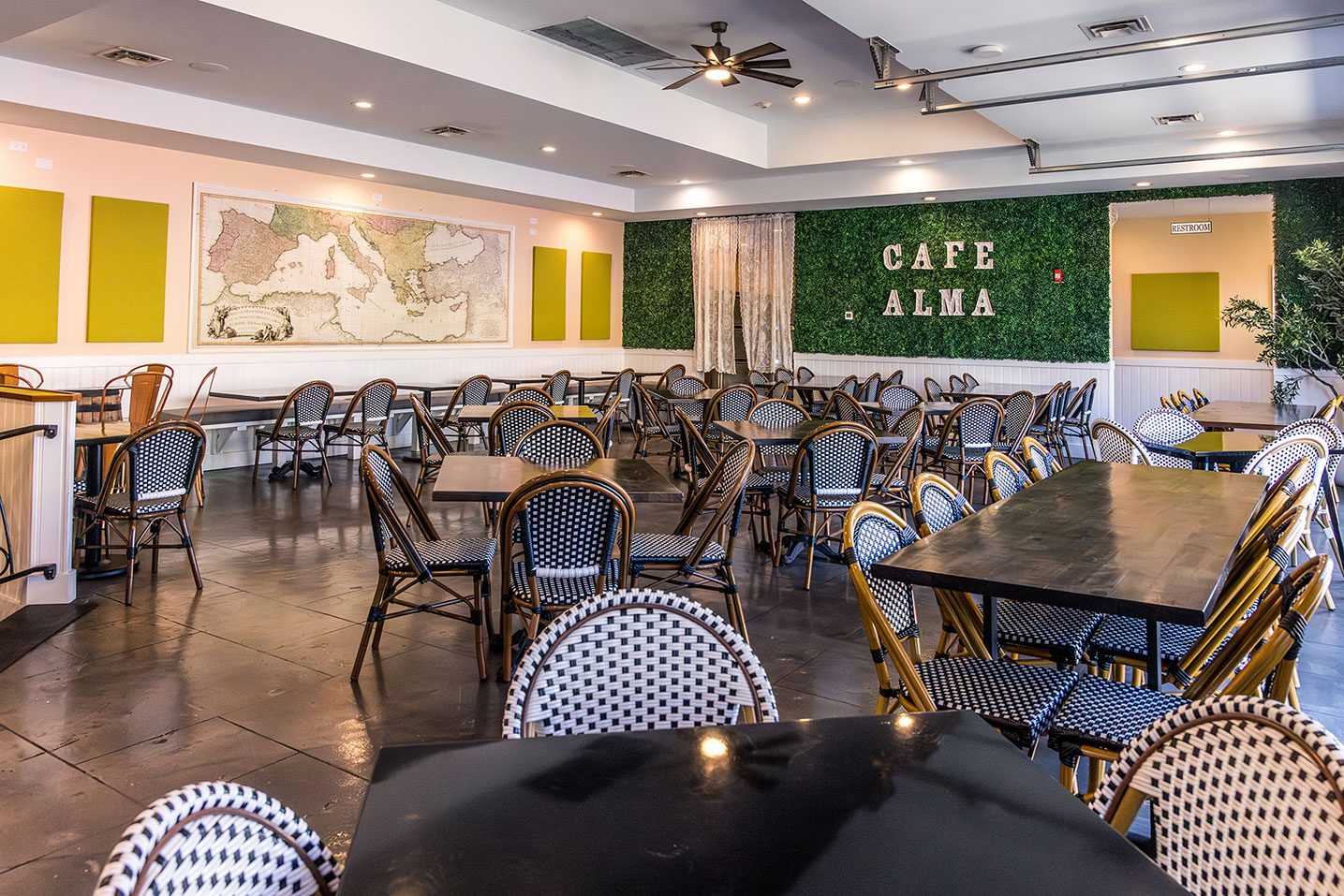
Photo credit: Catie Viox
Café Alma’s dining area
There’s a special kind of magic in a place that invites both everyday ritual and memorable experience. Café Alma does just that — anchoring itself in the heart of the neighborhood while offering something worth traveling across the city for. With its recent expansion into dinner service, this organic scratch kitchen brings the full rhythm of café culture to Cincinnati: morning coffee, midday gatherings and soulful evening meals.
Globally, café culture has long been a cornerstone of community life — especially in European and Middle Eastern cities where cafés are as much about social interaction as they are about food and drink. In Israel, cafés are woven into the cultural fabric, serving as casual meeting spots for artists, students, families and friends. You don’t just stop by for a quick coffee — you linger, converse and watch the world go by. This sense of hospitality and openness is at the core of Café Alma’s identity.
It starts with the small pleasures. Moist muffins topped with golden streusel and bursting with fresh fruit, paired with a cup of coffee so thoughtfully brewed that I exclaimed, “This is delicious,” at the very first sip. Or, if you’re feeling adventurous, you can choose from a variety of house-made Israeli-inspired specialties that blend bold flavors with nourishing ingredients.

Yair and Lainey Richler, owners of Café Alma
Café Alma’s menu is a love letter to Israeli cuisine, which itself is a vibrant tapestry of Jewish, Arab, North African, Mediterranean and Eastern European influences. Dishes like shakshuka (eggs poached in spiced tomato sauce), labneh with za’atar and fresh pita are not just trendy — they’re deeply rooted in tradition and memory. Café Alma interprets these flavors through a modern, health-conscious lens.
Much of Jewish cooking is rooted in the past. There is usually someone in the family who cooks brisket a certain way or who makes cookies using their grandmother’s recipes. Café Alma’s food references that past while building the future of Jewish cuisine. The food is original without being precious or off-putting, and healthy without being punishing.
These are the kinds of dishes that encourage conversation and connection — between old friends, new neighbors, or even just you and your own thoughts. The sabich sandwich — a pita stuffed with eggplant, egg and tangy mango amba sauce — is a particular standout, capturing the bold and surprising combinations that characterize Israeli street food. The kitchen balances innovation with familiarity, resulting in food that is both comforting and exciting.
For me, that connection is personal. My son lives in Israel, and dining here offered a moment of closeness across the miles. I ordered the Pasta Armonim, a Tel Aviv staple, and was completely drawn in by its layered textures and deep umami. Farfalle pasta, sautéed button mushrooms and water chestnuts came together in a creamy, herb-kissed sauce — earthy, rich and unforgettable. I brought some home and genuinely considered pulling over on the drive just to finish it.

Pasta Armonim
Behind the counter, there’s a palpable sense of intention. Café Alma isn’t just about serving food — it’s about cultivating a space where people feel seen, welcomed and nourished. The café’s name, Alma, is the Hebrew word for “soul,” and it lives up to that promise.
Whether you’re sipping espresso at the bar, working quietly in the corner or sharing dinner with loved ones, the experience feels thoughtful and deliberate.
That warmth and intentionality extend to the dinner menu, which has recently become a permanent part of Café Alma’s offerings. These evening meals continue the café’s mission of hospitality, with shareable plates, rich vegetarian options and seasonal ingredients that reflect the kitchen’s commitment to freshness. Israeli dining is often communal — meze spreads, shared entrees, lively tables — and Café Alma brings that spirit to life in a Midwest setting.
In Israel, the line between café and restaurant is often blurred. A place might serve coffee and pastries in the morning, lunch to a crowd of remote workers and dinner to couples out on a date. Café Alma channels this all-day dynamism. It doesn’t just serve a neighborhood; it reflects one.
Places like Café Alma show us how food can tell a story — not just about flavor, but about culture, memory and belonging. They’re reminders that hospitality isn’t just a service—it’s a value. In a world that often feels rushed and disconnected, Café Alma invites us to slow down, share a plate, and be part of something richer.





